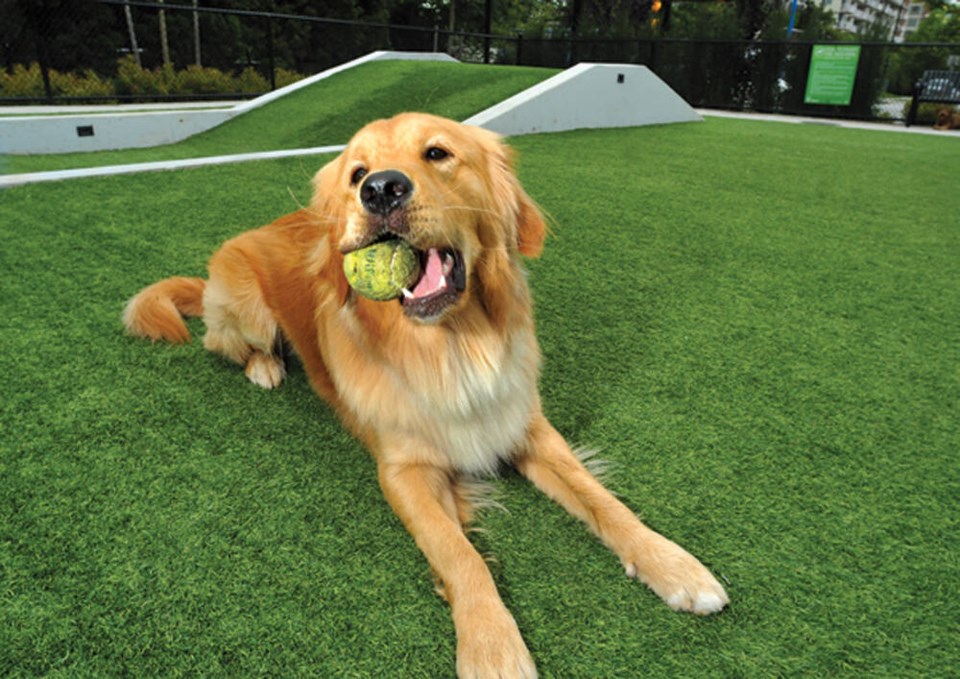West Vancouver has gone to the dogs.
On Monday night, a majority of council voted to move ahead on loosening the leash on longstanding restrictions that have kept canine companions from walking with their owners near many local parks and on the West Vancouver Seawalk.
Council voted to direct staff to change the animal control bylaws, which currently ban pooches from many public walking areas, including the Seawalk. Those changes must come back to council before they take effect.
Couns. Linda Watt and Christine Cassidy shepherded the effort to change the rules, arguing it’s past time that West Vancouver became more Fido friendly.
Currently, dogs aren’t allowed on the Seawalk in West Vancouver – except for the dog run area that is separated from the public walkway by a chain link fence. Dogs are also banned within five metres of many other public areas in the municipality, including playgrounds, sport fields, golf courses, tennis courts, basketball courts, recreational swimming beaches and picnic areas.
Cassidy and Watt said those bylaws are outdated, especially following the surge in pet ownership that followed the COVID pandemic. About 35 per cent of households have dogs, said Watt, adding that’s equal to about 6,000 households in West Vancouver.
Watt said when she started looking into the rules around where pooches can promenade, “I realized we were the most restrictive.” Watt said she only found community with similar restrictions – in a small suburb of Montreal.
Several dog owners showed up to council Monday night to support loosening restrictions on where dogs can be walked.
Michael Kates, who lives in Horseshoe Bay, said there are dozens of dog owners in his neighbourhood and “many of us were dismayed to see dogs are restricted from the [new Horseshoe Bay] park .”
Several speakers said most dog owners consider their furry friends like family and excluding dogs from popular areas like the Seawalk doesn’t promote inclusivity.
“I understand why people object if they are focusing on the bad dog owner stereotype,” said Jennifer Azizi. “But is it right to exclude all of us based on the selfish behaviour of a few?”
“It's public property. And lots of people have dogs. I get the not everybody likes or trusts dogs, but not everybody likes barbecues or marijuana or all music or goose poop or cyclists or skateboarders or busking. But all of these are legal,” she added.
Lisa Brasso told council there was “no logical basis for the current restrictions” and the spectre of “dogs fighting, barking, drooling and knocking people over with leash entanglements” hasn’t come to pass in other communities.
One member of the public, Norma Gibson, spoke against loosening the dog restrictions, saying doing so could make the Seawalk less inviting for people in wheelchairs, joggers, seniors or people with small children.
Several people wrote to council with similar concerns, adding loosening restrictions could mean a big influx of dog walkers from other areas using the Seawalk.
“People go there to listen to the ocean and look at the view, not to hear barking and sidestep things on the path," wrote one letter writer.
In response to a question from Coun. Sharon Thompson, the municipality’s bylaw manager said, “We do spend a large amount of time dealing with animal control complaints are specific to dogs, on beaches, on school fields, sports fields, and in areas that are assigned as prohibited areas.” The fine for having a dog in a banned area of West Vancouver is $150.
Coun. Nora Gambioli said she was neutral about dogs but was concerned about a lack of public consultation on the issue, especially when it proved to be such a hot topic when council discussed it over a decade ago. Staff said records show when council discussed loosening dog restrictions then, it raised hackles and prompted about 3,500 letters with opinions split 50/50 on the issue.
In response to Gambioli’s question about why she and Watt wished to have no widespread public consultation this time, Cassidy said, “If there’s two subjects that are inordinately divisive or difficult in this community, it’s trees and dogs … we did not want to go forward in this endless round of government bureaucracy or consultation and end up exactly at the same spot.”
Gambioli said she was opposed to changing the rules without a chance for the public to comment. “I think that a fulsome public discourse has not been had,” she said.
Mayor Mark Sager said his wife is a “lifelong dog rescuer,” but he has also received emails from people who are “dead opposed” to changing the rules.
“I came with a completely open mind, realizing we have had a lot of input on both sides,” said Sager. “But the world has changed.”
He added if council changes the dog restrictions and, “If it turned into a big disaster, council can always change it back.”
In the end, council voted to have staff change the bylaws to allow leashed dogs back on to the Seawalk – with Couns. Gambioli and Thompson opposed – and to do away with setback rules, meaning leashed dogs can now be walked on the outskirts of playgrounds and sports fields. The lifting of restrictions won’t apply to commercial dog walkers.
But the public shouldn’t be racing to the Seawalk with their canine companions right away. Monday’s vote directed staff to change the relevant animal control bylaws. Once that happens, the changes have to come back to council for further consideration and final adoption before new rules loosening restrictions take effect.
According to an earlier report by Watt and Cassidy, it will cost the municipality just under $7,400 in start-up costs to set up new dog waste bins and signs, and just under $6,300 annually in staff costs and dog poo bags to open the new areas to canines.
Council also voted to have staff sniff out a long-term dog strategy to make the municipality more dog-friendly.
[email protected]
twitter.com/janeseyd




